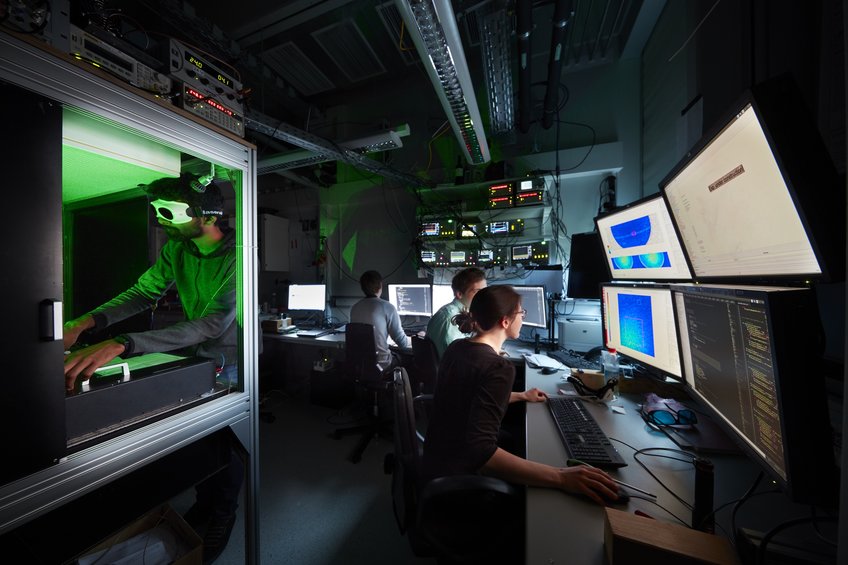
Open Positions in a New Joint Project on Fermion Quantum Processors (FermiQP)
FermiQP aims at realizing a new and scalable hybrid platform for analogue quantum simulation and digital quantum computing, thus combining the advantages of both concepts in one machine. We are hiring: PhD students, postdocs, mechanics and engineers.
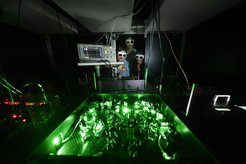
Quantum computers and simulators have the potential to solve a wide range of problems in materials science and quantum chemistry faster and more effectively than classical computers. Two of the most promising approaches are analogue quantum simulation and digital quantum computing. Analogue quantum simulators are already capable of realising a quantum advantage when solving specific problems. Ultracold atoms are a leading platform in this field and are so far unmatched in size and scalability. These advantages also bring ultracold atoms into focus for the development of digital quantum computers. These, on the other hand, allow for versatile and universal programmability. A platform that combines the advantages of analogue quantum simulation and digital quantum computing, in one system, promises the greatest possible medium- and long-term benefits.
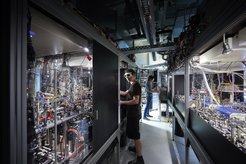
Germany has world-leading expertise in the field of ultracold atoms. Together with its high-performance photonics industry and research, this lays the foundationa for the development of transformative quantum technologies.
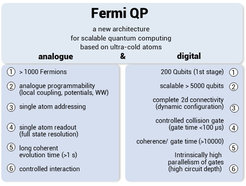
The newly formed joint project "Fermion Quantum Processor" (FermiQP) focuses on the development of a novel quantum processor architecture and its demonstration in the laboratory. The new architecture is intended to create advantages that no other platform can offer, first and foremost the possibility of using a quantum machine in two fundamentally different operating modes: An analogue mode, in which a quantum advantage is expected in the short term for specific questions in the field of quantum materials, as well as a digital mode, in which the processor is universally programmable. The analogue mode directly uses the fermionic nature of the processor to efficiently explore quantum materials. The digital mode offers competitive scalability, full parallelisability of all qubit operations and full connectivity of the processor. The overall goal of the collaborative project is to develop a powerful demonstrator for analogue quantum simulation and digital quantum computing based on Germany's long experience in quantum simulation with ultracold atoms and a unique extension to digital quantum computing. This demonstrator will be programmable via online access. Approximately 1000 to 10,000 atoms will be available in analogue mode and digital mode will offer approximately 200 fully interconnected qubits. Figure 1 summarises these goals.
Project partner
Each collaborative partner is developing a different aspect of the project:
Max Planck Institute of Quantum Optics - "Construction of the FermiQP Demonstrator":
The team at MPQ will build the demonstrator of the fermionic quantum processor, which can operate in both analogue and digital mode. At the same time, the team will test basic concepts of FermiQP on an existing platform as well as implement first analogue algorithms, which will be developed together with the theorists. The theoretical part of the team will develop algorithms adapted to the FermiQP architecture.
• Prof. Dr Immanuel Bloch (Max Planck Institute of Quantum Optics - MPQ)
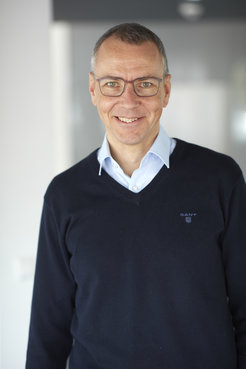
Prof. Dr. Immanuel Bloch (MPQ + LMU) is Scientific Director at the Max Planck Institute of Quantum Optics in Garching and Tenured Professor at the Ludwig Maximilian University in Munich. His work focuses on quantum simulation and quantum computing based on neutral atoms in optical traps. His work is among the pioneering work in this field and among the most highly cited work in the field of quantum physics, for which he has already been awarded numerous scientific awards. In addition to his commitment to research and teaching, he is also active in many ways as an advisor to national and international research institutions and funding bodies. He coordinates the EU flagship project PASQuanS.
• Prof. Dr Ignacio Cirac (Max Planck Institute of Quantum Optics - MPQ)
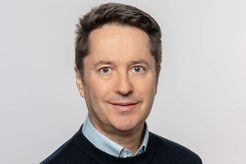
Prof. Dr. Ignacio Cirac (MPQ + TUM) is Scientific Director at the Max Planck Institute of Quantum Optics in Garching and Honorary Professor at the Technical University of Munich. He has been seminal in the first generation of quantum computers and simulators, especially those based on trapped ions and atoms in optical lattices. He has introduced a variety of quantum algorithms that demonstrate quantum acceleration compared to classical algorithms. He has also developed several methods for analysing many-body quantum systems based on both tensor networks and neural networks. Ignacio Cirac has received numerous prestigious awards for the development of quantum computers and simulators. He is a member of the EU project QTFLAG and the SuperQuLAN project, which is co-funded by the EU and the BMBF.
• Dr Philipp Preiss (Max Planck Institute of Quantum Optics - MPQ)
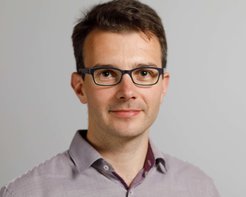
Dr Philipp Preiss will coordinate the construction of the FermiQP demonstrator at the MPQ as a principal investigator. He is an expert in the field of quantum simulation of few-body systems with ultracold atoms. During his PhD at Harvard University and his postdoc at Heidelberg University, he developed new techniques for single-atom control and imaging in quantum gas microscopes. This experience will feed directly into the realisation of local control capabilities in FermiQP. In parallel, he is working on new concepts for the fast preparation and characterisation of many-body systems in the lattice in his project funded by the ERC Starting Grant UniRand.
• Dr Timon Hilker (Max Planck Institute of Quantum Optics - MPQ)
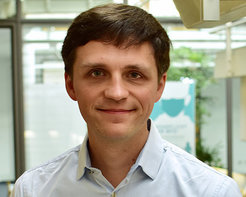
Dr Timon Hilker will support the construction of the new demonstrator as the second principal investigator. He is a specialist in quantum gas microscopes and leads the experiments on the existing fermion microscope at the MPQ. Here he works on strongly correlated quantum systems and realises exotic quantum phases. During his PhD, he made significant progress in setting up this experiment with optical superlattices and spin-resolved imaging techniques, which will now find new applications in FermiQP project. Furthermore, he has gained important experience with far-from-equilibrium quantum systems as part of the Marie Curie Programme at the University of Cambridge.
Ludwig Maximilians University Munich – "Data rate and coherence time for FermiQP":
The project partner LMU Munich is working on a systematic optimisation of the atomic transfer between the two main sections of the vacuum apparatus and the loading process into the optical lattice. In parallel, a new approach is being developed that allows direct preparation of the fermions in the lattice, which should significantly increase the data rate of the FermiQP processor in the long term. In addition, a magnetic field stabilisation is being designed to increase the coherence time of the qubit operations. All development steps will be developed and tested on existing platforms before being integrated into FermiQP.
• Prof. Dr Monika Aidelsburger (Ludwig Maximilians University Munich - LMU)

Prof. Dr Monika Aidelsburger (LMU) is a professor at the Ludwig Maximilian University of Munich. She works in the field of quantum simulations, in particular the development and realisation of experimental methods that enable analogue quantum simulations of new models. Stable optical superlattices are one of the central technological components here. Her project related to the extension of the optical lattice platform to local controllability with optical tweezers was awarded an ERC Starting Grant.
Eberhard Karls University Tuebingen – "Processor scaling and connectivity for FermiQP":
The project partner University of Tübingen addresses on the realisation of the connectivity of the FermiQP processor, in particular the subunit for the parallel transport of atoms in optical tweezers. An essential ingredient for the scalability of the FermiQP processor as well as for new applications of the analogue mode are new cooling methods for fermionic lithium. These are being developed at the University of Tübingen.
• Prof. Dr Christian Groß (Eberhard Karls University Tuebingen - UT)
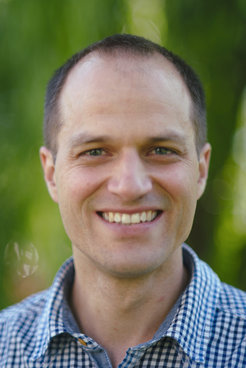
Prof. Dr Christian Groß (Uni Tübingen + MPQ) is an internationally recognised expert in the field of quantum simulation with quantum gas microscopes. In collaboration with Immanuel Bloch, he has developed a technologically world-leading platform based on ultracold lithium atoms in the optical lattice, on which the quantum processor proposed here is based. In particular, the core technologies of local addressing, highly stable superlattices and state-resolved detection have already been demonstrated here. Furthermore, he has developed a platform for position control of single atoms in optical tweezers, another core technology of the Fermion quantum processor, under an ERC grant. He is a member of the EU flagship project PASQuanS.
Other partners in the network:
- Prof. Dr Tommaso Calarco (Forschungszentrum Jülich - FZJ) - "Optimal control methods for FermiQP".
- Prof. Dr Jens Eisert (Free University Berlin - FUB) - "Theory for fermionic quantum processors".
- Prof. Dr Andreas Tünnermann (Fraunhofer Institute for Applied Optics and Precision Engineering Jena - IOF) - "Development of micro-optical beam delivery systems for optical addressing of individual qubits".
- TOPTICA Photonics AG - "Powerful frequency-converted laser systems for lithium-6 quantum processors".
- Robert Bosch GmbH and Covestro Deutschland AG (associated partners)
Open Positions
At MPQ:
- four scientific positions (doctoral and post-doctoral students)
- two technical positions (mechanics and engineers)
Applications by e-mail to immanuel.bloch@mpq.mpg.de
The project will start in late summer 2021 and run for four years.






















